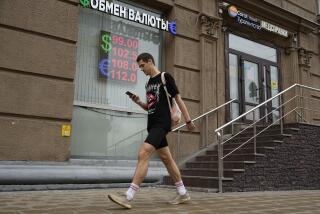Russia’s Parliament Criticizes Mishandling of Financial Crisis
- Share via
MOSCOW — The Russian parliament attacked the government Friday for mishandling a deepening financial crisis that was worsened by Monday’s surprise devaluation of the national currency, the ruble.
But Prime Minister Sergei V. Kiriyenko, defending his Cabinet’s actions before a hostile lower house, said in response: “We can’t afford the luxury of being a popular government.”
“This crisis has only just begun,” Kiriyenko said.
Bearing out his words, Russian markets and the ruble continued to fall. Stocks dropped 6.9% in the thinnest day of trading this year, bringing the market’s total drop so far in 1998 to 80%. The ruble finished the week at an official rate of 7.005 to the dollar, for a decline of more than 9% this week.
International confidence in Russia, already shaky, was dealt a sharp blow Monday when the government unexpectedly announced it would let the ruble depreciate by one-third by year’s end and would restructure $40 billion of ruble debt into longer-term securities to lower the debt servicing costs.
Adding to unease over the Russian economy, Finance Minister Mikhail M. Zadornov said Friday that the government is considering buttressing the ruble by imposing new restrictions on taking money out of the country. Later, he said the new controls would be aimed primarily at slowing the leakage of hard currency through exporters.
“We have been preparing these measures for a while, but because of the crisis their passage must be accelerated,” Zadornov said.
Despite the crisis mentality at high levels and a scramble by Russian citizens to withdraw rubles from banks to exchange into dollars, retail prices have yet to soar and the public mood remains calm.
“What difference does it make to me? My loaf of bread and stick of sausage cost the same today as they did yesterday,” said Galya Kolli, a choral singer. “I’m paying no attention to this storm in a teacup.”
Paying closer attention were bankers and government officials in Germany, who met Friday to discuss ways of preventing “Russian contagion” from spreading westward. German institutions are the biggest lenders to Russia and made loans totaling more than $30 billion in 1997.
Worries about Russia’s financial problems, and fears that German banks that lent heavily in the country could now be hurt, sent share prices tumbling on European markets.
The Russian Parliament’s lower house, the Duma, met in emergency session to hear what the government had to say about its financial crisis-management measures so far. Deputies in the almost powerless chamber voted overwhelmingly for President Boris N. Yeltsin to resign in a sign of growing anger among Yeltsin’s many opponents. The vote was nonbinding.
The Duma is scheduled to meet again next week, when it may debate possible revenue-raising measures. However, the unruly legislature--a motley crew of hot-tempered Communists, conservatives and nationalists--may prefer to limit itself to angry name-calling and revenge crusades.
International lending agencies that have pledged Russia $22.6 billion in financing have tied disbursement of loans to the government’s success in cutting its budget deficit and improving tax collection.
In July, however, the parliament’s refusal to pass some of the government’s planned measures forced Yeltsin to decree them into effect.
More to Read
Sign up for Essential California
The most important California stories and recommendations in your inbox every morning.
You may occasionally receive promotional content from the Los Angeles Times.













